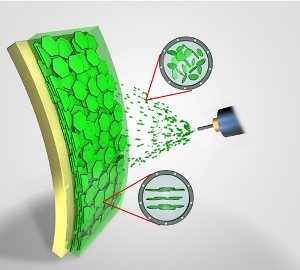Apr 11 2014
The promise of nanoparticles stems from their potential to modify the physical and mechanical properties of polymers for diverse applications, such as photovoltaic cells, sensors, and separation membranes. Methods currently used to create desired nanostructure, however, rely on complex and energy-intensive techniques, such as layer-by-layer or patterning approaches, which are limited in scale and often have poor stability.
 Nanoparticle-films
Nanoparticle-films
Publishing in Nature Communications (DOI: 10.1038/ncomms4589), Dr. Minhao Wong, a former graduate research assistant in the Polymer Technology Center of Dr. H-J Sue, Department of Materials Science and Engineering, and Dr. Ryohei Ishige of I2CNER (International Institute for Carbon-Neutral Energy Research), Kyushu University in Japan, have developed a simple approach of applying a surface coating of thin, flat nanoplatelets using a common spray gun, such as can be purchased off-the-shelf from an art supply store, to create a surface coating in which nanoplatelets spontaneously self-assemble into “nano-walls.” The nano-walls act as rigid barriers that prevent oxygen gas from reaching the surface, and are effective at low and high humidity levels.
Using this scalable and simple processing method, researchers have achieved extremely fine and highly ordered nano-scale features that are conventionally achieved with complex and energy-intensive manufacturing techniques. This new technology is expected to be immediately useful in any application where blocking oxygen molecules is important, such as anti-corrosion paints for metal surfaces. The technique is simple and could be easily extended to other functional nanosheets.
To understand this process, imagine a bricklayer who dumps a barrow of bricks and the bricks spontaneously build up into a wall on their own. A similar process of “self-assembly” occurs for the nanoplatelets to create nano-walls that increase the barrier efficiency of the film by more than twenty times.
The advantage of the spray-coating method is its simplicity. It is now possible to achieve very fine and highly ordered nanoscale features that are usually seen only through the use of photolithographic manufacturing techniques. This means that the same degree of order can be achieved without the need for clean room facilities.
In the future, researchers hope to adjust the composition of the nanoplatelets to control the passage of gas molecules through the nano-wall, for very inexpensive, yet efficient, gas separation membranes useful in industrial processes. They are also interested in introducing new functionalities such as electrical conductivity or sensitivity to magnetic fields, so that large-area smart nano-walls can be fabricated. Many different kinds of nanoplatelets may potentially be used with this technology, so there are potentially countless possibilities for applications. In addition, incorporating different nanoplatelets to create hierarchical structures with improved properties is seen as another promising application for this technology.
For more information, Dr. H-J Sue
Department of Materials Science and Engineering
Polymer Technology Laboratory